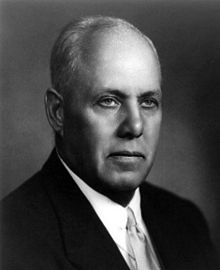George Meany
William George Meany (born August 16, 1894 in New York City , † January 10, 1980 in Washington, DC ) was an American trade union official .
biography
Meany began his career as a union official in 1923 as Secretary-Treasury of the Building Trades Council of New York City. He was then president of the New York State Trade Union Confederation between 1934 and 1940 .
In 1940 he moved to the national umbrella union American Federation of Labor (AFL), where he was again executive treasurer until 1952.
On November 25, 1952, he became president of the AFL as the successor to the late William Green . In particular, there were disputes with the then Minister of Labor James P. Mitchell . Meany's greatest achievement in this office, however, was the merger of two competing and different organizations in 1955: the AFL as the umbrella trade union of the craft and the Congress of Industrial Organizations (CIO), the central union of industrial workers, under the chairman Walter Reuther .
On December 5, 1955, he became President of the resulting powerful umbrella organization AFL-CIO and held this office for around 24 years until November 15, 1979.
In 1957 he excluded the influential transport workers union International Brotherhood of Teamsters from the AFL-CIO because he refused to work with its corrupt chairman Dave Beck and vice chairman Jimmy Hoffa . However, critics accused Meany that he only took this step after public criticism and remained inactive beforehand. He was also accused of being slow to integrate minorities in the union. However, he later supported the introduction of general equal pay for equal work, which ultimately became part of the Civil Rights Act of 1964 .
During this time, there were also repeated internal disputes with the former CIO President and President of the major automobile workers' union ( United Auto Workers ) Walter Reuther, which ultimately led to the UAW resigning from the AFL-CIO umbrella organization in 1968.
As president of the AFL-CIO, he never hesitated to express his conservative views and criticized all US presidents during his active union work from Franklin D. Roosevelt to Jimmy Carter for their economic and foreign policy .
Meany was a relentless opponent of communism and a supporter of the US stance in the Vietnam War, despite emerging protests. In 1977 he pushed for the United States to leave the International Labor Organization (ILO) when it rejected a repressive, critical stance on the trade union policy in the communist states.
On November 15, 1979, he resigned as President of the AFL-CIO after twelve consecutive terms. Four days later, the previous Executive Treasurer Lane Kirkland was elected to succeed him.
Honors
- 1960: Great Cross of Merit with Star and Shoulder Ribbon of the Federal Republic of Germany
- 1963: Presidential Medal of Freedom
Web links
- rulers.org
- George Meany in the Munzinger archive ( beginning of article freely available)
| personal data | |
|---|---|
| SURNAME | Meany, George |
| ALTERNATIVE NAMES | Meany, William George (full name) |
| BRIEF DESCRIPTION | American trade unionist |
| DATE OF BIRTH | August 16, 1894 |
| PLACE OF BIRTH | New York City |
| DATE OF DEATH | January 10, 1980 |
| Place of death | Washington, DC |
